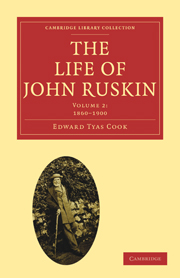Book contents
- Frontmatter
- Contents
- CHAPTER I UNTO THIS LAST (1860)
- CHAPTER II EXILE (1861–1863)
- CHAPTER III BOULOGNE—LUCERNE—MILAN (1861–1862)
- CHAPTER IV MORNEX—MUNERA PULVERIS (1862–1863)
- CHAPTER V HOME LIFE AT DENMARK HILL (1864–1866)
- CHAPTER VI SESAME AND LILIES—THE GROWN OF WILD OLIVE—THE ETHICS OF THE DUST (1865, 1866)
- CHAPTER VII TIME AND TIDE (1866, 1867)
- CHAPTER VIII RUSKIN's POLITICAL ECONOMY
- CHAPTER IX ABBEVILLE AND VERONA (1868, 1869)
- CHAPTER X OXFORD PROFESSOR (1870–1878)
- CHAPTER XI FIRST OXFORD LECTURES (1870, 1871)
- CHAPTER XII A DARK YEAE (1871)
- CHAPTER XIII BOTTICELLI (1872, 1873)
- CHAPTER XIV WITH ST. FRANCIS AT ASSISI (1874)
- CHAPTER XV THE END OF A ROMANCE (1875)
- CHAPTER XVI HOME LIFE AT BRANTWOOD (1872–1876)
- CHAPTER XVII VENICE REVISITED (1876–1877)
- CHAPTER XVIII FORS CLAVIGERA (1871–1878)
- CHAPTER XIX THE ST. GEORGE'S GUILD
- CHAPTER XX THE RUSKIN MUSEUM
- CHAPTER XXI SCHOOLS OF ST. GEORGE
- CHAPTER XXII ARROWS OF THE CHACE
- CHAPTER XXIII “THE DREAM” (1877–1878)
- CHAPTER XXIV STUDIES OF FLOWERS AND ROCKS (1878)
- CHAPTER XXV RETURN TO WORK (1878–1880)
- CHAPTER XXVI THE BIBLE OF AMIENS. FURTHER ILLNESSES (1880–1882)
- CHAPTER XXVII SECOND PROFESSORSHIP AT OXFORD (1882–1885)
- CHAPTER XXVIII PRÆTERITA (1885–1889)
- CHAPTER XXIX OLD AGE AND LAST WORKS (1886–1889)
- CHAPTER XXX CLOSING YEARS (1889–1900)
- CHAPTER XXXI CHARACTERISTICS
- CHAPTER XXXII INFLUENCE
- INDEX
CHAPTER XXIV - STUDIES OF FLOWERS AND ROCKS (1878)
Published online by Cambridge University Press: 07 September 2011
- Frontmatter
- Contents
- CHAPTER I UNTO THIS LAST (1860)
- CHAPTER II EXILE (1861–1863)
- CHAPTER III BOULOGNE—LUCERNE—MILAN (1861–1862)
- CHAPTER IV MORNEX—MUNERA PULVERIS (1862–1863)
- CHAPTER V HOME LIFE AT DENMARK HILL (1864–1866)
- CHAPTER VI SESAME AND LILIES—THE GROWN OF WILD OLIVE—THE ETHICS OF THE DUST (1865, 1866)
- CHAPTER VII TIME AND TIDE (1866, 1867)
- CHAPTER VIII RUSKIN's POLITICAL ECONOMY
- CHAPTER IX ABBEVILLE AND VERONA (1868, 1869)
- CHAPTER X OXFORD PROFESSOR (1870–1878)
- CHAPTER XI FIRST OXFORD LECTURES (1870, 1871)
- CHAPTER XII A DARK YEAE (1871)
- CHAPTER XIII BOTTICELLI (1872, 1873)
- CHAPTER XIV WITH ST. FRANCIS AT ASSISI (1874)
- CHAPTER XV THE END OF A ROMANCE (1875)
- CHAPTER XVI HOME LIFE AT BRANTWOOD (1872–1876)
- CHAPTER XVII VENICE REVISITED (1876–1877)
- CHAPTER XVIII FORS CLAVIGERA (1871–1878)
- CHAPTER XIX THE ST. GEORGE'S GUILD
- CHAPTER XX THE RUSKIN MUSEUM
- CHAPTER XXI SCHOOLS OF ST. GEORGE
- CHAPTER XXII ARROWS OF THE CHACE
- CHAPTER XXIII “THE DREAM” (1877–1878)
- CHAPTER XXIV STUDIES OF FLOWERS AND ROCKS (1878)
- CHAPTER XXV RETURN TO WORK (1878–1880)
- CHAPTER XXVI THE BIBLE OF AMIENS. FURTHER ILLNESSES (1880–1882)
- CHAPTER XXVII SECOND PROFESSORSHIP AT OXFORD (1882–1885)
- CHAPTER XXVIII PRÆTERITA (1885–1889)
- CHAPTER XXIX OLD AGE AND LAST WORKS (1886–1889)
- CHAPTER XXX CLOSING YEARS (1889–1900)
- CHAPTER XXXI CHARACTERISTICS
- CHAPTER XXXII INFLUENCE
- INDEX
Summary
“To see a world in a grain of sand
And a heaven in a wild flower ;
Hold infinity in the palm of your hand,
And eternity in an hour.”
—William Blake.“ I want ever so many things now from my rooms,” Ruskin wrote, on recovery, to a friend at Oxford (May 14, 1878); “I'm getting well into my plant-work again, and missals. I'm not overworking, and never will any more, but the doctors are all quite unable to make me out. My work is to me Air and Water, and they might just as well tell a sick fish to lie on its back, or a sick swallow to catch no flies, as me not to catch what's in the air of passing fancy.”
His flower-fancies pleased without exciting him. To his friend, F. S. Ellis, the bookseller, he wrote that the spring flowers were to be his models of behaviour—“they grow— and do—as they like exactly; which I perceive to be the intention of Providence that they—and I—should, and propose to follow their good example as I best can.” He was engaged in devising a new botanical nomenclature, and sought advice on some points of Greek word-formation:—
(To Dean Liddell.) “Nov., 1878.—I am very thoroughly grateful for your kindness in looking over these proofs; and more than happy in your indulgence to them.
- Type
- Chapter
- Information
- The Life of John Ruskin , pp. 409 - 425Publisher: Cambridge University PressPrint publication year: 2010First published in: 1911



